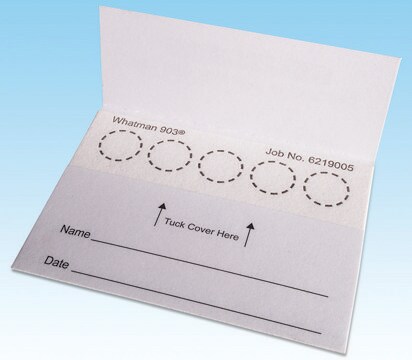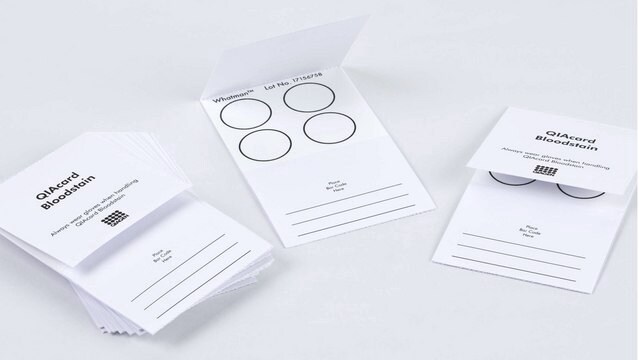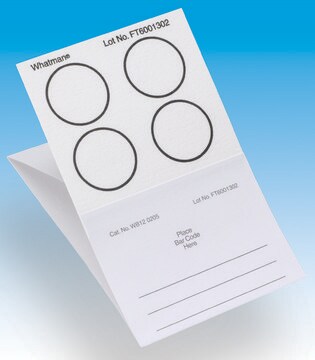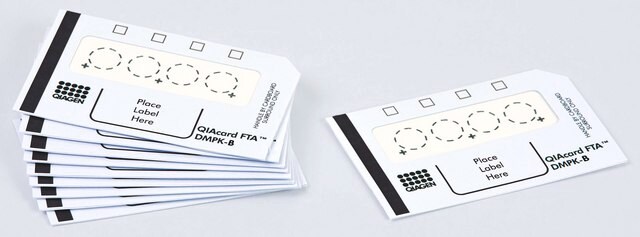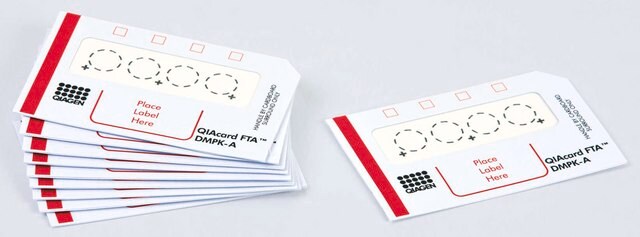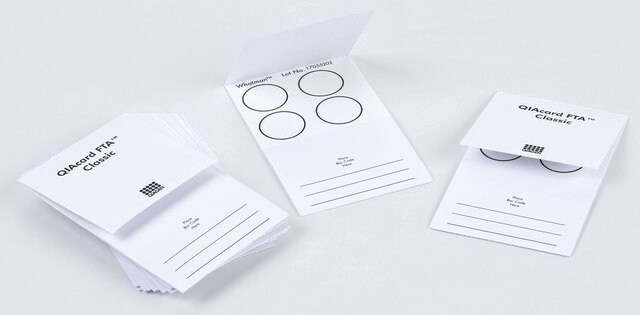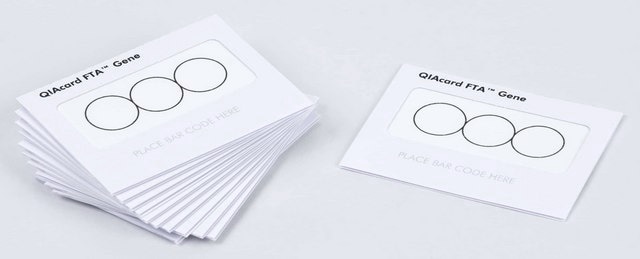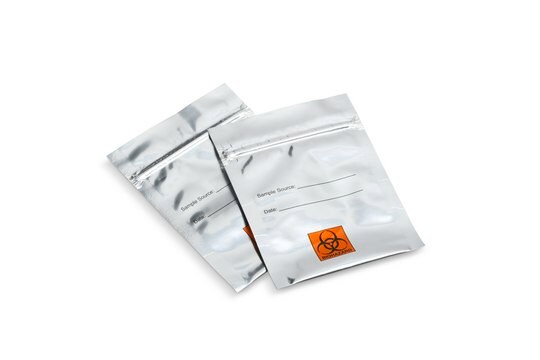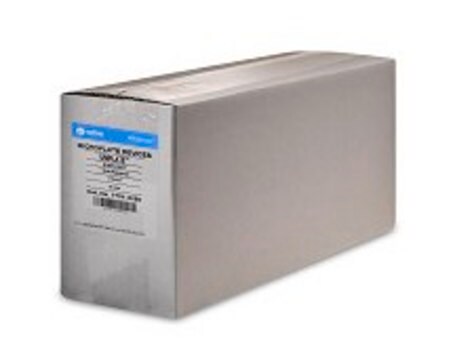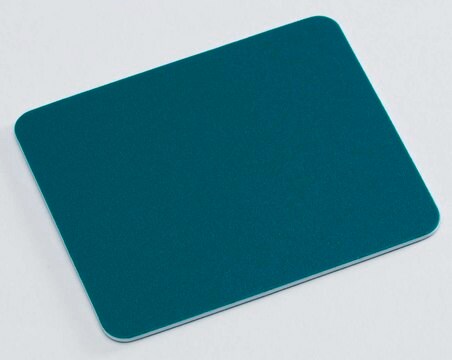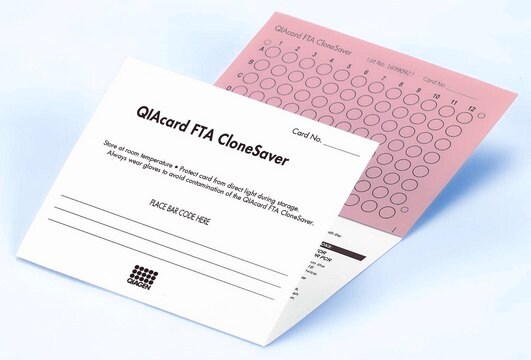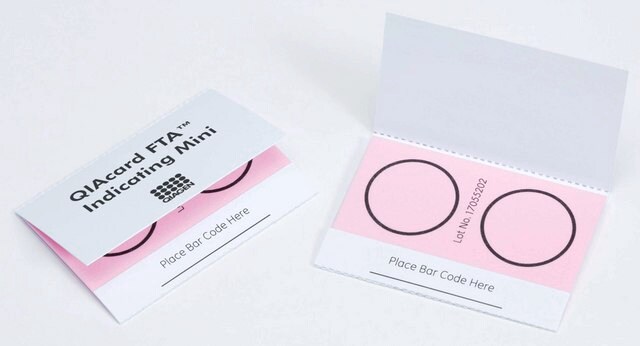WHAWB129243
QIAcard™ FTA™ DMPK Cards
FTA DMPK-C card, 4 sample areas per card, pack of 100 cards
Synonim(y):
whatman dmpk, whatman fta
Zaloguj sięWyświetlanie cen organizacyjnych i kontraktowych
About This Item
Kod UNSPSC:
41105500
NACRES:
NB.22
Polecane produkty
Materiały
white
producent / nazwa handlowa
Qiagen WB129243
opakowanie
pack of 100 cards
Szukasz podobnych produktów? Odwiedź Przewodnik dotyczący porównywania produktów
Opis ogólny
Drug Metabolism (DM) Pharmacokinetic (PK) studies provide crucial insight into the way drug candidates behave in the body. These studies are a critical step in drug development.
QIAcard™ FTA™ DMPK Cards for Drug Metabolism Pharmacokinetics enable microvolume sampling with only 10 to 20 µl per sample and are designed for use with blood samples. The cards can also be used with colorless samples such as plasma, cerebrospinal fluid and urine.
QIAcard™ FTA™ DMPK-A contains impregnated chemicals enabling protein denaturation to inactivate endogenous enzymes. Cell lysis releases endogenous cellular materials onto card. Stabilization of DNA allows resampling of blood spot for pharmacogenomics. Impregnated chemicals may interfere with mass spectrometry detection e.g. ion suppression.
QIAcard™ FTA™ DMPK Cards for Drug Metabolism Pharmacokinetics enable microvolume sampling with only 10 to 20 µl per sample and are designed for use with blood samples. The cards can also be used with colorless samples such as plasma, cerebrospinal fluid and urine.
QIAcard™ FTA™ DMPK-A contains impregnated chemicals enabling protein denaturation to inactivate endogenous enzymes. Cell lysis releases endogenous cellular materials onto card. Stabilization of DNA allows resampling of blood spot for pharmacogenomics. Impregnated chemicals may interfere with mass spectrometry detection e.g. ion suppression.
Cechy i korzyści
- DBS microvolume sampling requires only 10—20 μl per sample.
- Consistent data are obtained through more serial sampling from individual animals.
- Less reliance on composite data.
- The 3-step DBS procedure is more straightforward than the cumbersome centrifugation, isolation and clean-up of plasma.
- Conveys greater analyte stability through on-substrate clean-up, especially for enzyme-sensitive compounds.
- Room temperature stability saves on cost of dry ice shipments and allows remote sampling.
Inne uwagi
Analysis is primarily with HPLC or UHPLC followed by MS/MS detection, direct desorption MS techniques such as DESI. Methanol or aqueous/organic mixtures have been shown to work well for small molecules and aqueous buffers are recommended for proteins. Select a good solvent for the analyte while maintaining compatibility with the HPLC conditions to be used. The choice of DMPK card depends on many factors such as the analyte chemical structure, extraction solvent and analysis workflow.
Field of Use : For internal research use only
Field of Use : For internal research use only
Informacje prawne
FTA is a trademark of Qiagen Group
QIAcard is a trademark of Qiagen Group
Ta strona może zawierać tekst przetłumaczony maszynowo.
Wybierz jedną z najnowszych wersji:
Certyfikaty analizy (CoA)
Lot/Batch Number
It looks like we've run into a problem, but you can still download Certificates of Analysis from our Dokumenty section.
Proszę o kontakt, jeśli potrzebna jest pomoc Obsługa Klienta
Masz już ten produkt?
Dokumenty związane z niedawno zakupionymi produktami zostały zamieszczone w Bibliotece dokumentów.
Klienci oglądali również te produkty
Matthew Barfield et al.
Analytical chemistry, 83(1), 118-124 (2010-12-09)
A novel approach has been developed for the quantitative determination of circulating drug concentrations in clinical studies using dried plasma spots (DPS) on paper substrates, rather than conventional plasma samples. A quantitative bioanalytical high-pressure liquid chromatography-tandem mass spectrometry (HPLC-MS/MS) assay
Neil Spooner et al.
Analytical chemistry, 81(4), 1557-1563 (2009-01-22)
A novel approach has been developed for the quantitative determination of circulating drug concentrations in clinical studies using dried blood spots (DBS) on paper, rather than conventional plasma samples. A quantitative bioanalytical HPLC-MS/MS assay requiring small blood volumes (15 microL)
Nasz zespół naukowców ma doświadczenie we wszystkich obszarach badań, w tym w naukach przyrodniczych, materiałoznawstwie, syntezie chemicznej, chromatografii, analityce i wielu innych dziedzinach.
Skontaktuj się z zespołem ds. pomocy technicznej